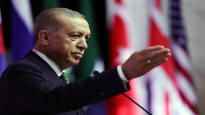Turkey will ratify Finland’s and Sweden’s NATO memberships by next summer, predicts American NATO expert John R. Deni. He estimates that Turkey will come under “infinitely hard” political pressure in NATO if and when Hungary’s promised ratification takes place in February and Turkey will be left alone after that.
– Predicting is of course dangerous, and this is my own assessment, but I strongly believe that we will see Turkey’s ratification in the first half of next year before the (NATO) summit in Vilnius in July, Deni, who visited Finland, says in an interview with STT.
So far, Turkey seems to be acting as it wants without, for example, the United States having much influence over its ally. According to Den, this is not the whole truth.
– I think that [Turkin] it is advantageous to create such an image – I think the US can put pressure on Turkey politically, says Deni.
Deni is a research professor of strategy at the US Army War College and has previously worked for several years in Europe as a political advisor to US military commanders. He emphasizes that the views expressed in the interview are his own opinions, not the official policies of the United States.
According to Den, while the delay in membership is not desirable, it has also been a good lesson about how NATO works. And not only for Finland, but also for NATO’s opponents, such as Russia and China.
– They have not fully understood that it is an organization of sovereign states based on consensus, where tiny Luxembourg has as much voting power in the NATO Council as the great United States.
Troops are requested from security producers
The delay in the last two ratifications also delays the making of defense plans in NATO that take into account the membership of Finland and Sweden. Although formal discussions have not yet started, Deni estimates that discussions about the roles of the two new member states are ongoing at an informal level.
For years, Finland has been an observer in NATO’s defense planning (NDPP), which operates on a four-year cycle. However, according to Den, it is quite a different thing to participate in the process as an actor and also as a target when defining the goals for the military capabilities of each ally.
– I would think that Finland and Sweden will be asked to do more than currently, not only in their own region but also further afield, says Deni.
He compares Finland to Denmark, which NATO has required in its plans to equip a battalion-sized ground forces combat unit to be sent on a possible mission. According to Den, Finland could be asked for something similar.
– Finland’s most important task will of course remain maintaining its own territorial defense, after all, the country with the longest land border with Russia will become a member. I don’t think anyone in NATO disagrees with this, Deni adds.
He reminds that NATO is now expanding for the first time since the 1980s to countries that are militarily producers of security, not consumers.
– Poland can also be said to be like that today, but it took many years to get to that situation, says Deni
Multinational ground forces northern headquarters to Finland?
Planning must also be done from another point of view: how can NATO come to the aid of Finland and Sweden, which have been attacked, and what does it require? John R. Den has practical suggestions for this, which he wrote about earlier in the fall.
According to him, it would be a good idea to establish a multinational division headquarters in Finland (Multinational Division High North). Its main focus would be on ground forces, but the necessary air power, cyber and other capabilities would also be included. In Sweden, Deni would offer for consideration the establishment of a combined air operations center (Combined Air Operations Center High North).
The role of both would be to act as both a national and an international staff, where the tasks should be at least 85 percent filled by representatives of the host country. According to Deni, this is because too many multinationals have been found to hinder cooperation in NATO, at least the lower you go in the command structure and organization.
In order to facilitate the reception of international aid, Deni proposes, among other things, the advance storage of weapons, ammunition and other supplies in Finland and Sweden to await the allied forces. According to him, the construction of ready-made frameworks as bases for foreign troops should also be considered.
In order to improve cooperation and readiness, Deni proposes to further increase the number and size of joint international exercises.
Source: STT
